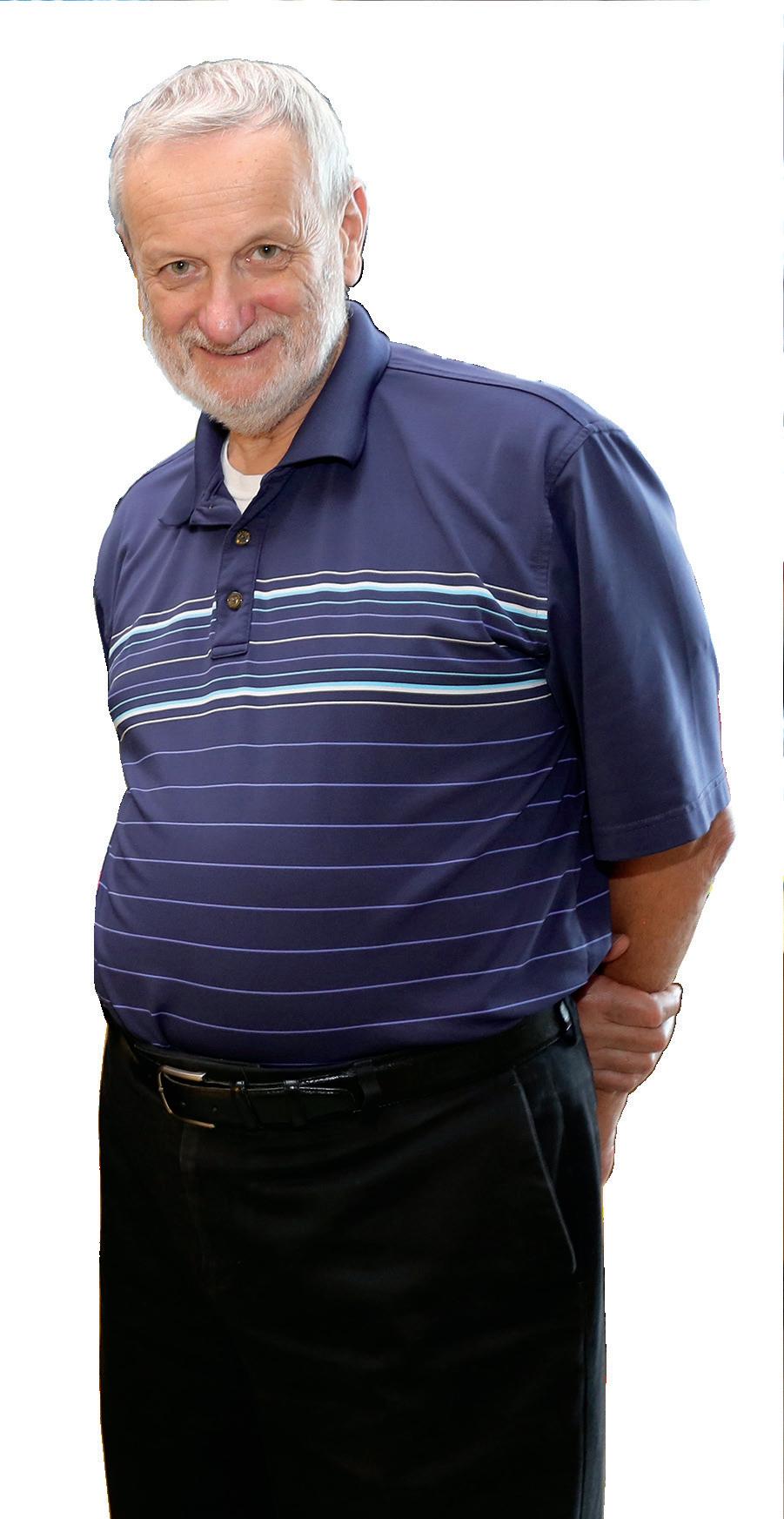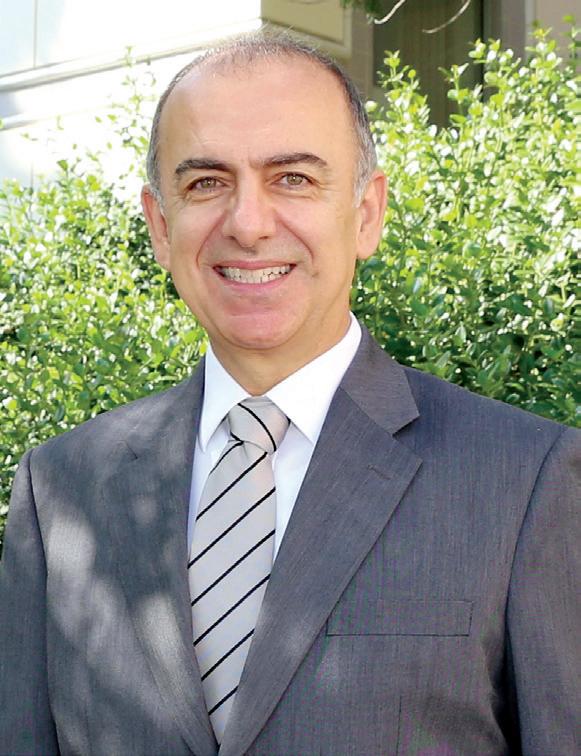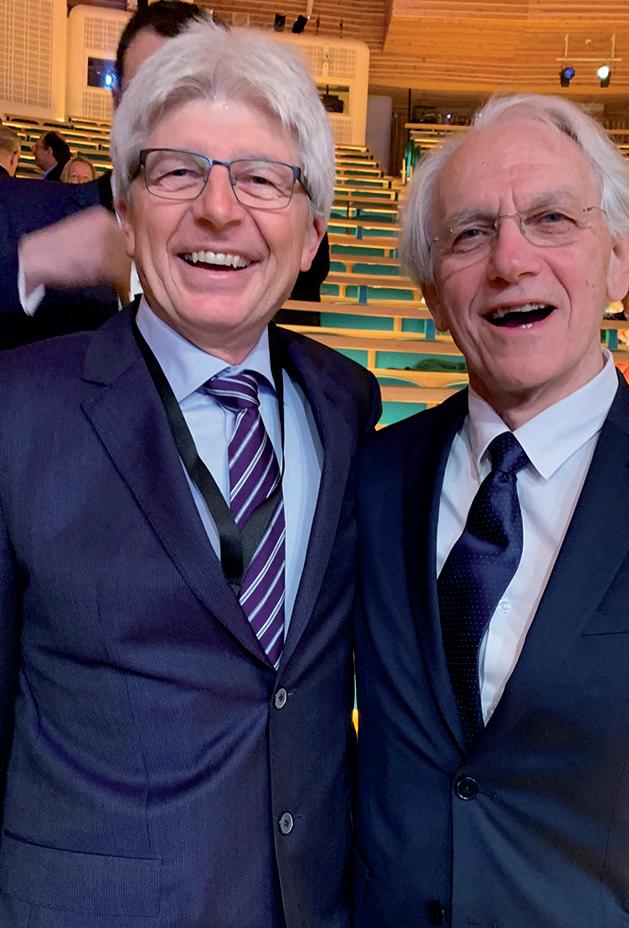
6 minute read
Accolades
LEE ELECTED FELLOW OF BMES AND NATIONAL ACADEMY OF INVENTORS
Abe Lee, biomedical engineering professor and outgoing department chair, was elected last year to both the Biomedical Engineering Society 2018 Class of Fellows and as a fellow of the National Academy of Inventors. BMES, the professional society for biomedical engineering and bioengineering has more than 7,000 members; Lee was one of 21 selected last year by his peers to receive the honor. The NAI designation is the highest professional distinction accorded solely to academic inventors who have demonstrated a prolific spirit of innovation in originating or facilitating outstanding inventions that have had a tangible impact on quality of life, economic development and the welfare of society. Lee is the ninth NAI fellow from UCI. “I am humbled to be recognized for what I love to do and am passionate about,” said Lee.
Advertisement
GRATTON NAMED AIMBE FELLOW
A UCI biomedical engineering professor is among 157 medical and biological engineers inducted this year into the College of Fellows of the American Institute for Medical and Biological Engineering (AIMBE). Enrico Gratton joined the College of Fellows class of 2019 at a ceremony held in March during the AIMBE Annual Meeting at the National Academy of Sciences in Washington, D.C. Election to the College of Fellows is a prestigious professional distinction; fellows, who are recognized for outstanding achievement, represent the top two percent of medical and biological engineers from around the world.
Gratton, professor of biomedical engineering, was elected “for seminal, outstanding contributions to the fields of fluorescence spectroscopy and imaging to study structure and function of biomolecules.” The founder and principal investigator of UCI’s Laboratory for Fluorescence Dynamics, the country’s only national
research center dedicated to fluorescence, Gratton also has joint appointments in physics and astronomy,
and surgery. His research focuses on biomedical fluorescence spectroscopy, including measurements and microscopy; and designing, testing and implementing fluorescence hardware, software and biomedical applications. These techniques can probe the structure and function of biomolecules and membranes, and track biological processes in cell and tissue cultures.


UCI Chancellor Howard Gillman appointed biomedical engineering Distinguished Professor Kyriacos A. Athanasiou to a Henry Samueli Endowed Chair in Engineering. Established in 2005 by the UC Regents, with funding from Henry and Susan F. Samueli, the endowed chair positions were created in support of engineering programs and other related disciplines within the Samueli School. This chair is the first in the department.
Athanasiou researches musculoskeletal and cartilaginous tissues and develops clinical instruments and devices. The senior academic has spent his career inventing biomimetic tissue for treating damaged knees, jaws, hips, shoulders and other joints. Along the way, Athanasiou has become an authority on translating engineering innovations into commercially available medical treatments. He is a recipient of the American Society of Mechanical Engineers 2018 Savio L-Y. Woo Translational Biomechanics Medal and a past president of the Biomedical Engineering Society. “Some of our best schools and programs, emerging colleges and great buildings at UCI carry the Samueli name,” said Athanasiou. “Inasmuch as I equate the Samuelis with excellence, it is such an honor for me to be named a recipient of the Henry Samueli Chair. I look forward to even greater accomplishments in translating our engineering advances to medical use.”
LIU HONORED WITH YOUNG INNOVATOR AWARD
COLLABORATION LEADS TO SPECIAL INVITATION

Samueli School professor Tibor Juhasz (left) attended the 2018 Nobel Prize ceremony in Stockholm, Sweden, where he watched his longtime collaborator Gerard Mourou win one of the Nobel Prizes in physics. Because his own research is so closely intertwined with that of Mourou, Juhasz received an invitation to both the Nobel ceremony and the four days of events surrounding it, including lectures, discussions, receptions, parties and a banquet with the Swedish king and royal family. Juhasz began working with Mourou in January 1987, when Juhasz joined Mourou’s lab at University of Rochester as a postdoctoral researcher. The two collaborated for years on chirped pulse amplification (CPA) lasers and the development of an ophthalmic femtosecond laser; Mourou is on the board of Juhasz’s startup company, ViaLase, a UCI spinoff that is developing new applications to treat anterior chamber disorders of the eye with the femtosecond laser.
“Gerard truly deserved this award, not only for his groundbreaking invention of CPA ... but also for his magnificent contribution to the optics community − from educating many excellent scientists to his visionary role in the establishment of numerous high-power laser research centers all around the word,” said Juhasz.
Chang Liu has received the 2019 Young Innovator Award from the American Chemistry Society’s Synthetic Biology journal. The recognition honors the contributions of a young scientist who has made a major impact on synthetic biology and/or related fields. Liu, assistant professor of biomedical engineering, conducts research in the fields of synthetic biology, chemical biology and directed evolution. He is particularly interested in engineering specialized genetic systems for rapid mutation and evolution to address problems ranging from protein engineering to developmental biology.
Liu has been recognized with a number of awards, including the Sloan Research Fellowship, the NIH New Innovator Award, the Beckman Young Investigator Award and the Dupont Young Professor Award. “The synthetic biology community is an extraordinary one, full of amazing scientists and engineers who have an ambitious vision for the future of bioengineering,” said Liu. “I am lucky to be a part of that group and honored to be recognized by them. I am also deeply thankful for the wonderful scientists in my lab, whose creativity, dedication and kindness make our research possible and make me love what we do.”

BIOMEDICAL ENGINEERING TEAM PLACES IN BUSINESS PLAN COMPETITION

A biomedical engineering team led by graduate student Ning Ma won second place in its semifinal round at the 2019 Rice University Business Plan Competition. The proposed company, called Embryologic, has developed a noninvasive imaging device that can assess the quality of an embryo for in vitro fertilization.
The UCI team was one of 42 competitors and one of 15 semifinalists. The Rice Business Plan Competition is a graduate-level student startup competition designed to give collegiate entrepreneurs a real-world experience to fine-tune their business plans and elevator pitches and to generate funding and successfully commercialize their product.
Embryologic’s device uses fluorescence lifetime imaging microscopy to measure intrinsic fluorescent signals from pre-implantation embryos. The team discovered that embryos have unique fluorescence lifetime signatures that change as they develop in each stage of division. The embryos also have unique signatures when they become unhealthy. Embryologic can assesses the developmental potential of pre-implantation embryos to increase the success rate of IVF and decrease the financial and emotional costs for couples.
Ma is a graduate student in the lab of Michelle Digman, biomedical engineering associate professor. “We have developed a machine learning algorithm called the embryo viability index to select the best embryo with the highest developmental potential,” said Ma. “We hope to bring safety and confidence to future parents going through in vitro fertilization.”








